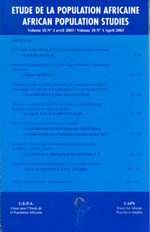
|
African Population Studies
Union for African Population Studies
ISSN: 0850-5780
Vol. 28, No. 2s, 2014, pp. 1146-1156
|
 Bioline Code: ep14056
Bioline Code: ep14056
Full paper language: English
Document type: Research Article
Document available free of charge
|
|
|
African Population Studies, Vol. 28, No. 2s, 2014, pp. 1146-1156
| fr |
WAYACK PAMBÈ, Madeleine; GNOUMOU/THIOMBIANO, Bilampoa & KABORÉ, Idrissa
Résumé
Depuis 2009, le gouvernement Burkinabè a lancé une Politique Nationale Genre pour promouvoir l'autonomie
des femmes et l'égalité entre les sexes. Cet article examine comment les caractéristiques socio-économiques
des femmes influencent deux aspects de leur autonomie : la prise de décision au sein du ménage et le vécu de
la violence domestique. Une régression logistique binaire a été appliquée à 9141 femmes mariées ou
cohabitant avec un conjoint à l'Enquête Démographique et de Santé de 2010 (EDS) du Burkina Faso. La
participation de la femme à la prise de décision est positivement associée à l'emploi rémunéré, l'éducation et
le niveau de vie élevé du ménage. Concernant la violence domestique, seule la pression psychologique est
associée à l'éducation et au niveau de vie du ménage. Le niveau élevé du capital humain et le revenu des
femmes influencent leur participation à la prise de décision au sein du ménage. La relation entre les
caractéristiques socio-économiques des femmes et la violence domestique parait complexe.
Mots Clés
Participation des femmes à la prise de décision; violence domestique; statut socioéconomique des femmes; Burkina Faso; Afrique subsaharienne
|
| |
| en |
Relationship between women’s socioeconomic status and empowerment in Burkina Faso: A focus on participation in decision-making and experience of domestic violence
WAYACK PAMBÈ, Madeleine; GNOUMOU/THIOMBIANO, Bilampoa & KABORÉ, Idrissa
Abstract
Since 2009, the Burkina Faso government has launched a national policy to empower women and to better integrate gender equity in policies, actions, and programs. This paper explores how socioeconomic characteristics shape two aspects of women’s empowerment: decision-making in the household and experience of domestic violence. Using binary logistic regression, data for 9,141 cohabiting or married women from the 2010 Burkina Faso Demographic and Health Survey (DHS) are analyzed. Decision-making is positively associated with working for cash, education and higher household wealth. Women’s experience domestic violence is weakly related to socioeconomic characteristics. Only psychological pressure is related to education and household wealth. The study show that high levels of human capital and financial autonomy influence women\'s participation in decision-making. The subtlety of the relationship between women’s empowerment and domestic violence is also shown. In acceptance of traditional gender roles, neither education nor financial autonomy is sufficient to assert women’s empowerment.
Keywords
women’s empowerment; decision-making in the household; domestic violence; Burkina Faso; Sub-Saharan Africa
|
| |
© Copyright 2014 - African Population Studies
Alternative site location: http://www.uaps-uepa.org
|
|
